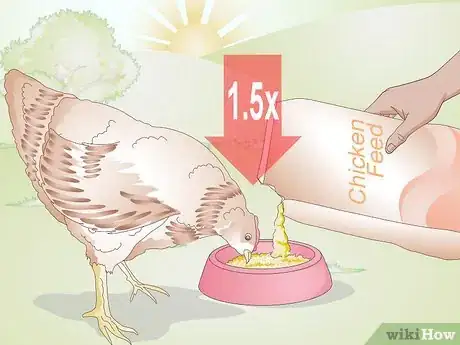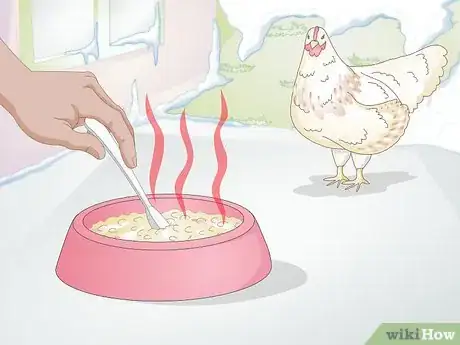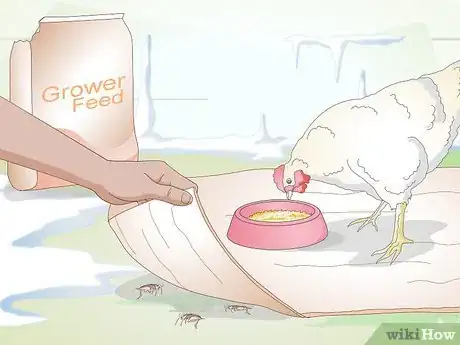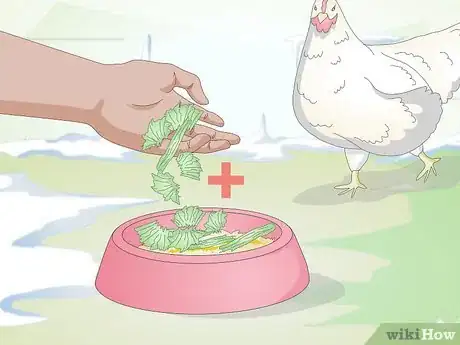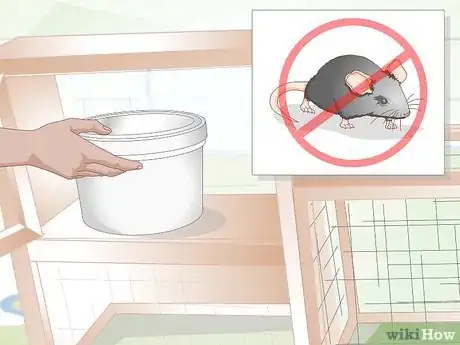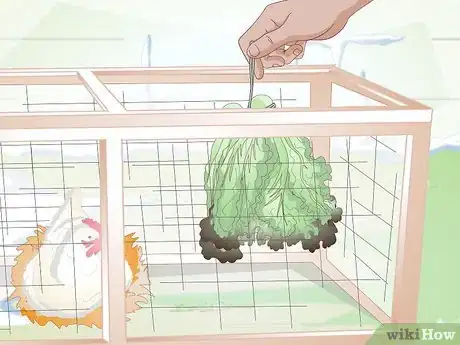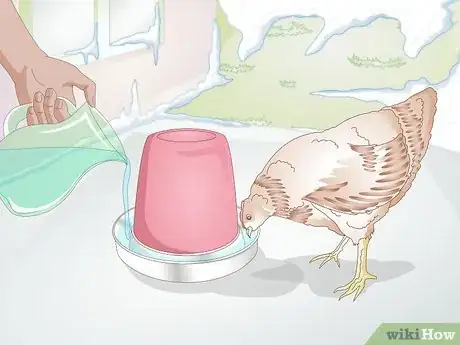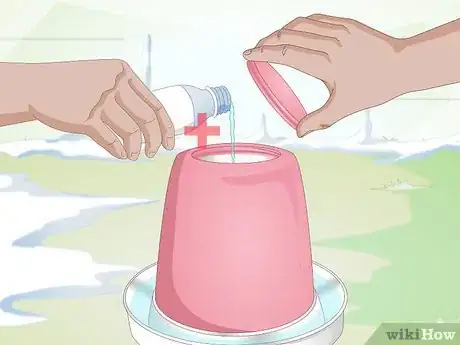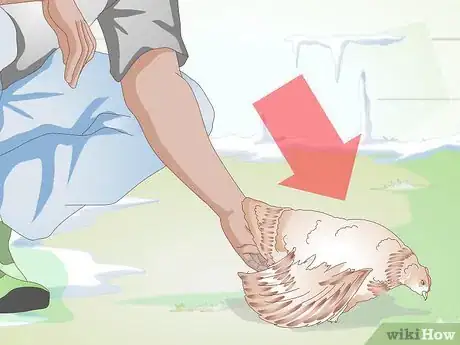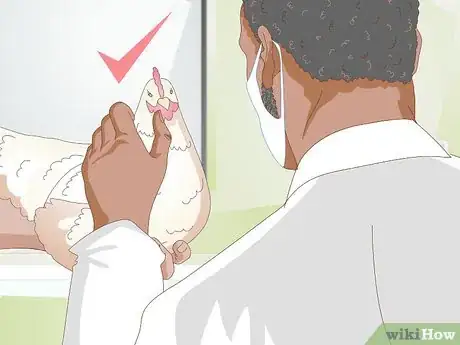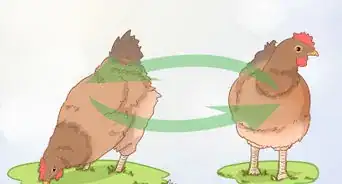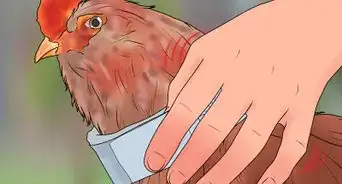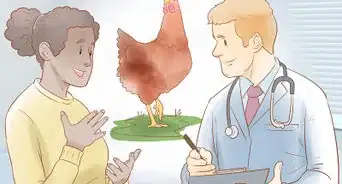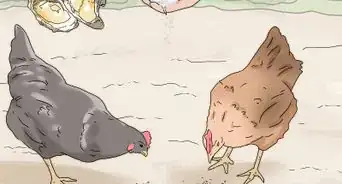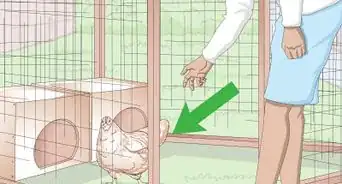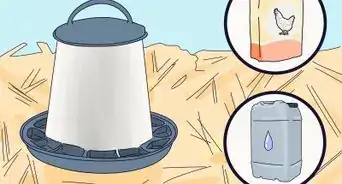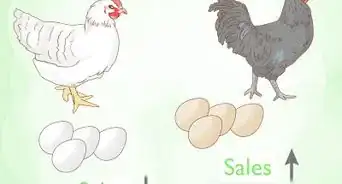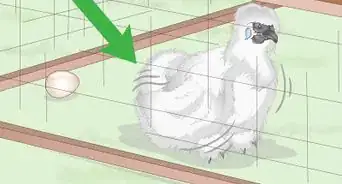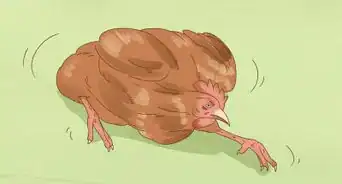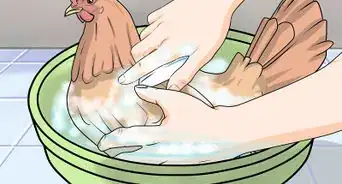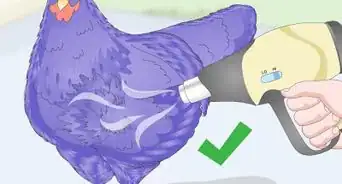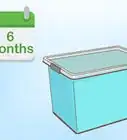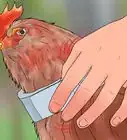This article was co-authored by wikiHow Staff. Our trained team of editors and researchers validate articles for accuracy and comprehensiveness. wikiHow's Content Management Team carefully monitors the work from our editorial staff to ensure that each article is backed by trusted research and meets our high quality standards.
wikiHow marks an article as reader-approved once it receives enough positive feedback. In this case, 96% of readers who voted found the article helpful, earning it our reader-approved status.
This article has been viewed 45,450 times.
Learn more...
Feeding chickens over the winter months takes some special considerations. Chickens, especially hens, generally need more food in the winter. You will also want to make sure your chickens have extra protein to keep their strength up during the colder months. You will want to feed your chickens from a trough in the winter, and should store food safely to avoid attracting rats and mice. Chickens may get sick in the winter, so keep an eye out for symptoms of the cold or flu. If your chicken gets sick, seek out the help of an avian veterinarian.
Steps
Using the Right Food
-
1Feed your chickens more food than you would in the spring and summer. Over the winter, chickens need more food as they're usually resting from summer and spring egg production. Aim to feed your chickens around 1.5 times what you would feed them in other months.[1]
- Feeding your chickens over the winter is not an exact science. It's okay to roughly guess how much is 1.5 times the normal amount.
- In general, chickens will not overeat. If you're upping their food intake too much, you will probably notice as they will be leftover food in the feeder in the morning.
-
2Make warm snacks like oatmeal. Carbohydrates are very important in the winter, for hens especially as they're recovering from laying eggs over the warmer months. Oatmeal is a good source of carbohydrates, and can be served to chickens warm. This can be a nice treat on particularly cool mornings.[2]
- Be careful how you feed your chickens oatmeal. It does not spread as easily as grains and other forms of chicken feed. If oatmeal is confined to one space, chickens may fight over the food. When spreading the oatmeal in the trough, make sure to spread it evenly throughout.
- If you want to add some variety, try adding maple syrup and bananas to your oatmeal.
Advertisement -
3Get your chickens more protein in the winter. Protein helps chickens grow the added feathers needed to stay warm during the winter months. Also, egg production slows down in the winter. If you want your chickens to continue laying eggs during these months, added protein may encourage them to lay a few eggs over the winter.[3]
- Try switching from regular chicken feed to game bird grower feed. These types of food generally have extra protein.
- Try laying a board down in your chicken coop, as long as the material the board is made from is chicken safe. Bugs may crawl under the board, which chickens may capture and eat. Bugs provide extra protein for your birds.
- If you have a cat, try adding a bit of cat food to your chickens' diet. Cat food is rich in protein and safe for chickens in moderation. Just make sure the cat cannot get into the chicken coop. If your cat goes into the coop searching for his food, he may behave in a predatory manner towards your chickens.
-
4Feed your chickens extra leafy green vegetables. It's a good idea to add leafy greens from your own kitchen to your chickens' diet during the winter. Winter will likely kill most natural plants near your chicken coop, so you'll have to supplement your chickens' diet with leafy green vegetables.[4]
- Kale, collard, chard, and spinach provide a lot of essential nutrients for chickens.
- Avoid iceberg lettuce, as it has very little nutritional value.
Providing and Protecting Food
-
1Make sure to use a trough when feeding in the winter. Do not feed chickens by sprinkling the pellets on the ground during the winter. This is not safe for your chickens and could result in food contamination. If you do not already have a trough for your chickens, purchase one at a hardware store and use it to feed your chickens during the winter months.[5]
- If the ground is frozen, pellets will get wet and soggy when thrown on the ground. Chickens are unlikely to eat soggy pellets.
- Troughs are much easier to clean. It takes a lot less of an effort to clean a trough than to clean food off the ground. This makes lessens the likelihood of rats and other predators entering the chicken coop due to the smell of food.
-
2Store extra food safely to keep mice and rats out of the coop. Rats and mice are tempted to enter warm places over the winter. If they can smell food, they're much more likely to enter a chicken coop. As rats and mice prey on chickens, store excess food in sealable containers if you store it in or near your chicken coop.[6]
- Never store food in a bag. Not only will this attract rats, your chickens may get into the bags.
- Instead, use a metal container with a lid, like an old trash can, to store bags of food. If you have a garage, you may want to store food here so it's away from your chicken coop altogether.
-
3Hang a "green piñata" in the chicken coop's run. A green piñata is simply a head of leafy greens, like a head of romaine lettuce, you tie up in the run. This will give chickens something to snack on during the winter months that's rich in the vitamins they need to thrive. If you hang it up, it will be off the ground and will not get too cold and wet for the chickens to eat.[7]
Preventing Common Problems
-
1Make sure your chickens are properly hydrated. Food is not the only thing that's important for chickens during the winter months. You want to make sure your birds get adequate water. Make sure your chickens have access to water at all times, and that you take measures to make sure the bowl does not freeze.[8]
- You can use a heated water bowl, which you can find at most pet stores. You can also place small rubber balls in the water, as long as you clean them first, if you live in an area with a slight breeze. The breeze will move the balls around, preventing the water from freezing.
- You should also check the water each time you check on your chickens. If it's frozen, or has been knocked over by wind, replace it with fresh water.
-
2Consider adding supplements to your chickens' water. It may be a good idea to add supplements to your chickens' water during the winter, as this can help your chickens get the increased vitamins they need for their coats and feathers. You can use leftover vegetable stock, add dried herbs to the water, or ask your vet about any nutritional supplements you can add to your chickens' water.[9]
-
3Watch for signs of sickness. With proper care, chickens should thrive even in winter. However, keep an eye out for signs of sickness. Chickens may get colds or flus during the winter.[10]
- Listen for heavy or labored breathing, as well as wheezing or coughing.
- Watch for changes in movement, like limping.
- You should also keep records of food consumption and water consumption. If your birds are suddenly consuming less food or water, one or all of them may be sick.
-
4See a vet if your birds get sick in the winter. If one of your chickens gets sick, remove her from the flock and contact an avian veterinarian in your area. You do not want the sickness to spread to the other birds. You may have to quarantine a sick chicken and give her antibiotics until the sickness passes.[11]
Community Q&A
-
QuestionHow much food do chickens eat in a day?
 SkiCommunity AnswerA well known ballpark figure for estimating purpose is 1/4 pound of feed per chicken per day.
SkiCommunity AnswerA well known ballpark figure for estimating purpose is 1/4 pound of feed per chicken per day.
Warnings
- Any foods given hot, need to make sure they are cool enough for the chickens to eat.⧼thumbs_response⧽
References
- ↑ http://www.thehappychickencoop.com/the-definitive-guide-to-keeping-chickens-in-winter-chapter-three/
- ↑ http://www.thehappychickencoop.com/the-definitive-guide-to-keeping-chickens-in-winter-chapter-three/
- ↑ http://pioneersettler.com/boost-chicken-feed-with-protein/
- ↑ http://www.gardenbetty.com/2013/01/keeping-your-chickens-healthy-through-winter/
- ↑ http://www.thehappychickencoop.com/the-definitive-guide-to-keeping-chickens-in-winter-chapter-three/
- ↑ http://www.motherearthnews.com/homesteading-and-livestock/keeping-chickens-in-winter.aspx
- ↑ http://www.gardenbetty.com/2013/01/keeping-your-chickens-healthy-through-winter/
- ↑ http://www.grit.com/animals/poultry/what-to-feed-chickens-in-winter-ze0z1312zjhar.aspx
- ↑ http://www.grit.com/animals/poultry/what-to-feed-chickens-in-winter-ze0z1312zjhar.aspx
About This Article
When feeding chickens during the winter, make sure to provide them with about 1.5 times the amount of food you would give them in warmer months, since they’ll be resting from spring and summer egg production. It’s also important to give your chickens more protein to encourage feather growth to keep them warm. One way you can do this is by laying down a wooden board in the chicken coop, which will attract lots of bugs for your chickens to eat. You should also give your chickens leafy greens like kale or spinach since natural plants will have died off from the cold. For more tips, like how to protect your chickens’ food from rodents, read on!
